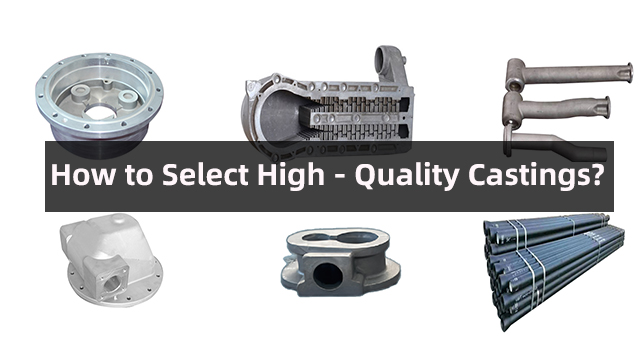How to Select High - Quality Castings?
2025-02-05 10:07:01 hits:0
How to Select High - Quality Castings? Tiegu Provides You with a Professional Guide

In the field of industrial manufacturing, castings are fundamental components of many products, and their quality directly affects the performance and reliability of the final products. Selecting high - quality castings is of utmost importance. Next, Tiegu will provide you with a professional guide to help you pick the castings that meet your needs from a wide range of products.
I. Understand Casting Materials
High - quality materials are the foundation of high - quality castings. Common casting materials include cast iron, cast steel, aluminum alloy, etc. Different materials have different characteristics. For example, cast iron has good wear resistance and shock absorption, and is suitable for manufacturing machine tool beds, engine blocks, etc.; cast steel has high strength and good toughness, and is often used in manufacturing mechanical parts, building structural parts, etc.; aluminum alloy has the characteristics of light weight and good thermal conductivity, and is widely used in the aerospace, automotive manufacturing and other fields. When selecting castings, the appropriate material should be chosen according to the product's usage environment and performance requirements. At the same time, pay attention to the purity and composition ratio of the material to ensure that it meets relevant standards.
II. Examine the Production Process
The production process has a decisive impact on the quality of castings. Advanced casting processes can effectively reduce casting defects and improve the accuracy and performance of castings. For example, the lost foam casting process can produce castings with complex shapes and high dimensional accuracy, and the surface quality is good; the investment casting process is suitable for manufacturing small and precise castings. In addition, the melting, pouring, cooling and other links in the casting process cannot be ignored. A high - quality melting process can ensure the purity and temperature uniformity of the molten metal; reasonable pouring speed and temperature can avoid defects such as misruns and cold shuts; a slow and uniform cooling process helps to reduce the internal stress of the casting and prevent deformation and cracking.
III. Inspect the Appearance of Castings
Appearance is the first impression for judging the quality of castings. The surface of high - quality castings should be smooth and flat, without obvious sand holes, gas holes, shrinkage cavities, cracks and other defects. Sand holes are holes formed by the mixing of molding sand into the molten metal, gas holes are voids formed by the failure of gas to escape during the solidification of the casting, shrinkage cavities are holes generated due to the volume shrinkage of the casting during solidification, and cracks will seriously affect the strength and service life of the casting. When inspecting the appearance of castings, carefully observe whether there are such defects. For some small defects, tools such as magnifying glasses can be used for inspection.
IV. Evaluate the Performance of Castings
In addition to the appearance, the performance of castings is also an important indicator for measuring their quality. This includes the mechanical properties of castings, such as strength, hardness, toughness, etc.; physical properties, such as density, coefficient of thermal expansion, etc.; and chemical properties, such as corrosion resistance, etc. When selecting castings, these performances should be evaluated according to the product's usage requirements. For example, mechanical parts used to bear heavy loads need to have high strength and hardness; while castings used in corrosive environments need to have good corrosion resistance. You can check the quality inspection reports of castings or ask the supplier to provide relevant test data to understand whether the performance of the castings meets the requirements.
V. Select a Reliable Supplier
Selecting a reliable supplier is the key to ensuring the acquisition of high - quality castings. A good supplier should not only have advanced production equipment and technology, but also have a complete quality management system and after - sales service. As a professional supplier of pig iron and castings, Tiegu has many years of industry experience, adopts advanced production processes and strict quality inspection standards to ensure that each product meets high - quality requirements. At the same time, Tiegu also provides comprehensive after - sales service to solve the problems encountered by customers during the use process. When selecting a supplier, its reliability can be evaluated through on - site inspections, understanding its customer reputation, checking its qualification certificates, etc.
Selecting high - quality castings requires comprehensive consideration of materials, processes, appearance, performance, and suppliers. It is hoped that this guide can help you make a wise choice when purchasing castings and ensure that your products have a reliable quality foundation. If you have any questions about castings, please feel free to contact Tiegu, and we will be happy to serve you.

 en
en  fra
fra  de
de  ru
ru  gle
gle  th
th  ara
ara  it
it  jp
jp  kor
kor  zh
zh 


